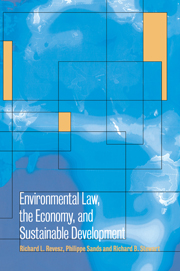 Environmental Law, the Economy and Sustainable Development
Environmental Law, the Economy and Sustainable Development Book contents
- Frontmatter
- Contents
- List of contributors
- Introduction: environmental regulation in multi-jurisdictional regimes
- PART I ENVIRONMENTAL REGULATION IN FEDERAL SYSTEMS
- PART II ENVIRONMENTAL REGULATION AND INTERNATIONAL TRADE
- PART III CHOICE OF ENVIRONMENTAL POLICY INSTRUMENTS
- PART IV THE ENVIRONMENTAL STANDARD - SETTING PROCESS
- PART V INTERNATIONAL ENVIRONMENTAL LAW AND SUSTAINABLE DEVELOPMENT
- 12 Environmental protection in the twenty-first century: sustainable development and international law
- 13 Markets and sustainability
- Index
13 - Markets and sustainability
Published online by Cambridge University Press: 03 May 2010
- Frontmatter
- Contents
- List of contributors
- Introduction: environmental regulation in multi-jurisdictional regimes
- PART I ENVIRONMENTAL REGULATION IN FEDERAL SYSTEMS
- PART II ENVIRONMENTAL REGULATION AND INTERNATIONAL TRADE
- PART III CHOICE OF ENVIRONMENTAL POLICY INSTRUMENTS
- PART IV THE ENVIRONMENTAL STANDARD - SETTING PROCESS
- PART V INTERNATIONAL ENVIRONMENTAL LAW AND SUSTAINABLE DEVELOPMENT
- 12 Environmental protection in the twenty-first century: sustainable development and international law
- 13 Markets and sustainability
- Index
Summary
Introduction
Providing a definition is a good way to start talking about sustainability. There is no simple, operational, and generally agreed definition that we can lift from the literature, so let me suggest one. Sustainability is doing things that we can safely continue indefinitely: doing things that can be continued over long periods without unacceptable consequences, or without unacceptable risks of unacceptable consequences. This seems to capture much of what is implicit in general discussion, although it is perhaps more focused than the legal principles traced by Sands. Most people think of current fisheries policies as unsustainable: clearly they are so according to this definition. Energy policies, involving the emission of greenhouse gases, imply an unacceptable risk of climate change, and are unsustainable both in common parlance and by this definition. So are important aspects of agricultural policies, those that result in loss of soil fertility, or in massive run-offs of nutrients into rivers, lakes, and ground waters.
Given a working definition, a natural next step from an economic perspective is to ask: Do existing institutions lead us to make sustainable choices? This question is clearly rhetorical: the examples cited above show that the answer is “no.” Two more sets of questions follow immediately from this: Why not? And: What can we do about this?
I think we can group the answers to “Why not?” under three general headings.
- Type
- Chapter
- Information
- Environmental Law, the Economy and Sustainable DevelopmentThe United States, the European Union and the International Community, pp. 410 - 427Publisher: Cambridge University PressPrint publication year: 2000
- 2
- Cited by
